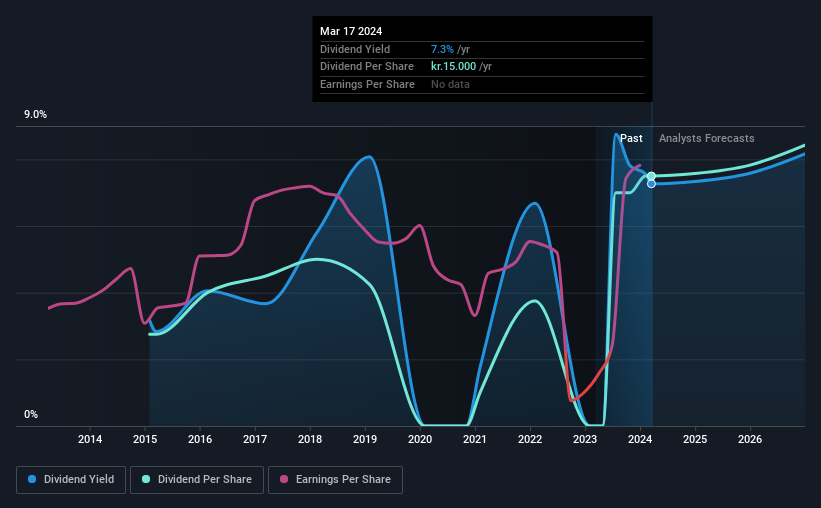There's A Lot To Like About Danske Bank's (CPH:DANSKE) Upcoming kr.7.50 Dividend

Some investors rely on dividends for growing their wealth, and if you're one of those dividend sleuths, you might be intrigued to know that Danske Bank A/S (CPH:DANSKE) is about to go ex-dividend in just 4 days. The ex-dividend date is usually set to be one business day before the record date which is the cut-off date on which you must be present on the company's books as a shareholder in order to receive the dividend. The ex-dividend date is of consequence because whenever a stock is bought or sold, the trade takes at least two business day to settle. Therefore, if you purchase Danske Bank's shares on or after the 22nd of March, you won't be eligible to receive the dividend, when it is paid on the 26th of March.
The company's next dividend payment will be kr.7.50 per share, and in the last 12 months, the company paid a total of kr.15.00 per share. Calculating the last year's worth of payments shows that Danske Bank has a trailing yield of 7.3% on the current share price of kr.206.40. If you buy this business for its dividend, you should have an idea of whether Danske Bank's dividend is reliable and sustainable. So we need to check whether the dividend payments are covered, and if earnings are growing.
Check out our latest analysis for Danske Bank
Dividends are usually paid out of company profits, so if a company pays out more than it earned then its dividend is usually at greater risk of being cut. Danske Bank paid out 59% of its earnings to investors last year, a normal payout level for most businesses.
When a company paid out less in dividends than it earned in profit, this generally suggests its dividend is affordable. The lower the % of its profit that it pays out, the greater the margin of safety for the dividend if the business enters a downturn.
Click here to see the company's payout ratio, plus analyst estimates of its future dividends.

Have Earnings And Dividends Been Growing?
Companies with consistently growing earnings per share generally make the best dividend stocks, as they usually find it easier to grow dividends per share. If earnings fall far enough, the company could be forced to cut its dividend. With that in mind, we're encouraged by the steady growth at Danske Bank, with earnings per share up 8.9% on average over the last five years.
Many investors will assess a company's dividend performance by evaluating how much the dividend payments have changed over time. Since the start of our data, nine years ago, Danske Bank has lifted its dividend by approximately 12% a year on average. We're glad to see dividends rising alongside earnings over a number of years, which may be a sign the company intends to share the growth with shareholders.
Final Takeaway
Should investors buy Danske Bank for the upcoming dividend? Earnings per share have been growing at a reasonable rate, and the company is paying out a bit over half its earnings as dividends. We think there are likely better opportunities out there.
If you're not too concerned about Danske Bank's ability to pay dividends, you should still be mindful of some of the other risks that this business faces. For instance, we've identified 2 warning signs for Danske Bank (1 is a bit unpleasant) you should be aware of.
A common investing mistake is buying the first interesting stock you see. Here you can find a full list of high-yield dividend stocks.
New: Manage All Your Stock Portfolios in One Place
We've created the ultimate portfolio companion for stock investors, and it's free.
• Connect an unlimited number of Portfolios and see your total in one currency
• Be alerted to new Warning Signs or Risks via email or mobile
• Track the Fair Value of your stocks
Have feedback on this article? Concerned about the content? Get in touch with us directly. Alternatively, email editorial-team (at) simplywallst.com.
This article by Simply Wall St is general in nature. We provide commentary based on historical data and analyst forecasts only using an unbiased methodology and our articles are not intended to be financial advice. It does not constitute a recommendation to buy or sell any stock, and does not take account of your objectives, or your financial situation. We aim to bring you long-term focused analysis driven by fundamental data. Note that our analysis may not factor in the latest price-sensitive company announcements or qualitative material. Simply Wall St has no position in any stocks mentioned.
About CPSE:DANSKE
Danske Bank
Provides various banking products and services to corporate, institutional, and international clients.
Solid track record established dividend payer.


